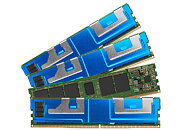- Joined
- Oct 9, 2007
- Messages
- 47,895 (7.38/day)
- Location
- Dublin, Ireland
| System Name | RBMK-1000 |
|---|---|
| Processor | AMD Ryzen 7 5700G |
| Motherboard | Gigabyte B550 AORUS Elite V2 |
| Cooling | DeepCool Gammax L240 V2 |
| Memory | 2x 16GB DDR4-3200 |
| Video Card(s) | Galax RTX 4070 Ti EX |
| Storage | Samsung 990 1TB |
| Display(s) | BenQ 1440p 60 Hz 27-inch |
| Case | Corsair Carbide 100R |
| Audio Device(s) | ASUS SupremeFX S1220A |
| Power Supply | Cooler Master MWE Gold 650W |
| Mouse | ASUS ROG Strix Impact |
| Keyboard | Gamdias Hermes E2 |
| Software | Windows 11 Pro |
Intel Optane persistent memory (PMem), in combination with Intel's open-source distributed asynchronous object storage (DAOS) solution, sets a new world record, soaring to the top of the Virtual Institute for I/O IO-500 list. With just 30 servers of Intel Optane PMem, Intel's DAOS solution defeated today's best supercomputers and now ranks No. 1 for file system performance worldwide. These results validate the solution's delivery as having the most performance of any distributed storage today. They also demonstrate how Intel is truly changing the storage paradigm by providing customers the persistence of disk storage with the fine-grained and low-latency data access of memory in its Intel Optane PMem product.
"The recent IO-500 results for DAOS demonstrate the continuing maturity of the software's functionality enabled by a well-managed code development and testing process. The collaborative development program will continue to deliver additional capabilities for DAOS in support of Argonne's upcoming exascale system, Aurora," said Gordon McPheeters, HPC systems administration specialist at the Argonne Leadership Computing Facility.

DAOS with Intel Optane PMem made its debut onto the IO-500 list at SC19. This year, Intel customers Texas Advanced Computing Center (TACC) and Argonne National Lab also entered DAOS with Intel Optane PMem solutions, which landed at No. 3 and No. 4 on the full list, respectively. In the 10-node challenge, where systems are compared with 10 clients each, the three Intel Optane PMem DAOS solutions took the top three rankings (Intel, TACC and Argonne). Both lists are important for the assessment of file system efficiency, client performance and scalability on mass scale installations.
"We are extremely grateful to our partners, software developers and larger ecosystem for helping us achieve the No. 1 ranking," said Alper Ilkbahar, vice president of the Data Platforms Group and general manager of the Memory and Storage Products Group at Intel. "Only with the combination of DAOS and Intel persistent memory can such performance be reached today. We are very excited to continue to innovate with our partners and customers and keep pushing the limits of speed and performance."
For more information: DAOS 1.0 was newly released in June, targeted at partner integration and the DAOS proof-of-concept program, and is now ready to test drive.
View at TechPowerUp Main Site
"The recent IO-500 results for DAOS demonstrate the continuing maturity of the software's functionality enabled by a well-managed code development and testing process. The collaborative development program will continue to deliver additional capabilities for DAOS in support of Argonne's upcoming exascale system, Aurora," said Gordon McPheeters, HPC systems administration specialist at the Argonne Leadership Computing Facility.

DAOS with Intel Optane PMem made its debut onto the IO-500 list at SC19. This year, Intel customers Texas Advanced Computing Center (TACC) and Argonne National Lab also entered DAOS with Intel Optane PMem solutions, which landed at No. 3 and No. 4 on the full list, respectively. In the 10-node challenge, where systems are compared with 10 clients each, the three Intel Optane PMem DAOS solutions took the top three rankings (Intel, TACC and Argonne). Both lists are important for the assessment of file system efficiency, client performance and scalability on mass scale installations.
"We are extremely grateful to our partners, software developers and larger ecosystem for helping us achieve the No. 1 ranking," said Alper Ilkbahar, vice president of the Data Platforms Group and general manager of the Memory and Storage Products Group at Intel. "Only with the combination of DAOS and Intel persistent memory can such performance be reached today. We are very excited to continue to innovate with our partners and customers and keep pushing the limits of speed and performance."
For more information: DAOS 1.0 was newly released in June, targeted at partner integration and the DAOS proof-of-concept program, and is now ready to test drive.
View at TechPowerUp Main Site



